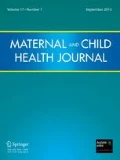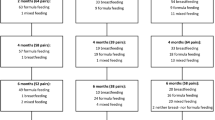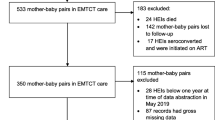Abstract
Objective HIV-exposed uninfected infants are almost twice as likely to die compared to infants born to HIV-uninfected women. HIV-exposed uninfected children whose mothers are on ART and who are breastfed have the lowest risk of dying by 24 months of age. Interventions to improve breastfeeding among HIV-infected mothers are needed. We aimed to assess the association between support/counseling provided by healthcare workers following delivery and the rate of exclusive breastfeeding (EBF) at 6-week postpartum. Methods This is a secondary analysis of data collected as part of a trial to evaluate the effect of conditional cash transfers on retention in and uptake of PMTCT services. Between April 2013 and August 2014, newly diagnosed HIV-infected women, ≤ 32 weeks pregnant, registering for antenatal care (ANC), in 89 clinics in Kinshasa, Democratic Republic of Congo, were recruited and followed through 6 weeks postpartum. At 6-week, participants were asked if they had given anything other than breastmilk to their infant in the 24 h preceding the interview (No = EBF) and whether a nurse or a doctor talked to them about breastfeeding after they gave birth (YES = received breastfeeding support/counseling). Logistic regression was used to estimate the odds ratios (OR) and 95% confidence intervals (CI) measuring the strength of the association between EBF and receiving breastfeeding support/counseling by a healthcare provider following delivery. Results Of 433 women enrolled, 328 attended a 6-week postpartum visit including 320 (97%) with complete information on EBF. Of those 320, 202 (63%) reported giving nothing other than breastmilk to their infant in the previous 24 h; 252 (79%) reported that a healthcare provider came to talk to them about breastfeeding following delivery. Mothers who reported receiveing breastfeeding support/counseling from a healthcare provider were more likely to exclusively breastfeed compared to those who did not (69% vs. 38%, OR 3.74; 95% CI 2.14–6.54). Adjustment for baseline sociodemographic characteristics did not change the association substantially, (adjusted OR 3.72; 95% CI 2.06–6.71). Conclusion for Practice Receipt of breastfeeding support/counseling from a healthcare provider after delivery among HIV-infected mothers in care at 6-weeks postpartum in Kinshasa almost quadrupled the odds of EBF.

Similar content being viewed by others
References
Aishat, U., David, D., & Olufunmilayo, F. (2015). Exclusive breastfeeding and HIV/AIDS: A crossectional survey of mothers attending prevention of mother-to-child transmission of HIV clinics in southwestern Nigeria. Pan African Medical Journal. https://doi.org/10.11604/pamj.2015.21.309.6498.
Arikawa, S., Rollins, N., Jourdain, G., Humphrey, J., Kourtis, A. P., Hoffman, I.,… Becquet, R. (2017). Contribution of maternal ART and breastfeeding to 24-month survival in HIV-exposed uninfected children: An individual pooled analysis of African and Asian studies. Clinical Infectious Diseases. https://doi.org/10.1093/cid/cix1102
Black, R. E., Allen, L. H., Bhutta, Z. A., Caulfield, L. E., de Onis, M., Ezzati, M., et al. (2008). Maternal and child undernutrition: Global and regional exposures and health consequences. Lancet, 371(9608), 243–260. https://doi.org/10.1016/S0140-6736(07)61690-0.
Brahmbhatt, H., Kigozi, G., Wabwire-Mangen, F., Serwadda, D., Lutalo, T., Nalugoda, F., et al. (2006). Mortality in HIV-infected and uninfected children of HIV-infected and uninfected mothers in rural Uganda. Journal of Acquired Immune Deficiency Syndromes, 41(4), 504–508. https://doi.org/10.1097/01.qai.0000188122.15493.0a.
Chisenga, M., Siame, J., Baisley, K., Kasonka, L., & Filteau, S. (2011). Determinants of infant feeding choices by Zambian mothers: A mixed quantitative and qualitative study. Maternal and Child Nutrition, 7(2), 148–159. https://doi.org/10.1111/j.1740-8709.2010.00264.x.
Edmond, K. M., Zandoh, C., Quigley, M. A., Amenga-Etego, S., Owusu-Agyei, S., & Kirkwood, B. R. (2006). Delayed breastfeeding initiation increases risk of neonatal mortality. Pediatrics, 117(3), e380–e386. https://doi.org/10.1542/peds.2005-1496.
Farquhar, C., Mbori-Ngacha, D. A., Bosire, R. K., Nduati, R. W., Kreiss, J. K., & John, G. C. (2001). Partner notification by HIV-1 seropositive pregnant women: Association with infant feeding decisions. AIDS, 15(6), 815–817. Retrieved from https://www.ncbi.nlm.nih.gov/pubmed/11371706, https://www.ncbi.nlm.nih.gov/pmc/articles/PMC3358138/pdf/nihms-359815.pdf. Accessed 21 Dec 2017.
Gatti, L. (2008). Maternal perceptions of insufficient milk supply in breastfeeding. Journal of Nursing Scholarship, 40(4), 355–363. https://doi.org/10.1111/j.1547-5069.2008.00234.x.
Genetu, H., Yenit, M. K., & Tariku, A. (2017). Breastfeeding counseling and support are associated with continuous exclusive breastfeeding from one week to six months of age among HIV exposed infants in north Gondar zone, Ethiopia: A cross-sectional study. International Breastfeeding Journal. https://doi.org/10.1186/s13006-017-0113-1.
Hampanda, K. (2016). Intimate partner violence against HIV-positive women is associated with sub-optimal infant feeding practices in Lusaka, Zambia. Maternal and Child Health Journal, 20(12), 2599–2606. https://doi.org/10.1007/s10995-016-2087-9.
Hoddinott, P., Britten, J., Prescott, G. J., Tappin, D., Ludbrook, A., & Godden, D. J. (2009). Effectiveness of policy to provide breastfeeding groups (BIG) for pregnant and breastfeeding mothers in primary care: Cluster randomised controlled trial. BMJ, 338, a3026. https://doi.org/10.1136/bmj.a3026.
Hsu, Y. H., Liu, Y., Hannan, M. T., Maixner, W., Smith, S. B., Diatchenko, L.,… Jordan, J. M. (2015). Genome-wide association meta-analyses to identify common genetic variants associated with hallux valgus in Caucasian and African Americans. Journal of Medical Genetics, 52(11), 762-769. https://doi.org/10.1136/jmedgenet-2015-103142
Ikeako, L. C., Ezegwui, H. U., Nwafor, M. I., Nwogu-Ikojo, E., & Okeke, T. C. (2015). Infant feeding practices among HIV-positive women in Enugu, Nigeria. British Journal of Medicine and Medical Research, 8(1), 61–68. https://doi.org/10.9734/BJMMR/2015/16980.
Iliff, P. J., Piwoz, E. G., Tavengwa, N. V., Zunguza, C. D., Marinda, E. T., Nathoo, K. J.,… group, t. Z. s. (2005). Early exclusive breastfeeding reduces the risk of postnatal HIV-1 transmission and increases HIV-free survival. AIDS, 19(7), 699-708. https://doi.org/10.1097/01.aids.0000166093.16446.c9
Jones, G., Steketee, R. W., Black, R. E., Bhutta, Z. A., & Morris, S. S. (2003). How many child deaths can we prevent this year? Lancet, 362(9377), 65–71. https://doi.org/10.1016/S0140-6736(03)13811-1.
Kramer, M. S., Aboud, F., Mironova, E., Vanilovich, I., Platt, R. W., Matush, L.,… Shapiro, S. (2008). Breastfeeding and child cognitive development: New evidence from a large randomized trial. Archives Of General Psychiatry, 65(5), 578–584. https://doi.org/10.1001/archpsyc.65.5.578.
Li, R., Fein, S. B., Chen, J., & Grummer-Strawn, L. M. (2008). Why mothers stop breastfeeding: Mothers’ self-reported reasons for stopping during the first year. Pediatrics, 122(Suppl 2), S69–S76. https://doi.org/10.1542/peds.2008-1315i.
Maonga, A. R., Mahande, M. J., Damian, J., & Msuya, S. E. (2016). Factors affecting exclusive breastfeeding among women in Muheza District Tanga Northeastern Tanzania: A mixed method community based study. Maternal and Child Health Journal, 20(1), 77–87. https://doi.org/10.1007/s10995-015-1805-z.
Mataya, R., Mathanga, D., Chinkhumba, J., Chibwana, A., Chikaphupha, K., & Cardiello, J. (2013). A qualitative study exploring attitudes and perceptions of HIV positive women who stopped breastfeeding at six months to prevent transmission of HIV to their children. Malawi Medical Journal, 25(1), 15–9. Retrieved from https://www.ncbi.nlm.nih.gov/pubmed/23717750, https://www.ncbi.nlm.nih.gov/pmc/articles/PMC3653193/pdf/MMJ2501-0015.pdf
McFadden, A., Gavine, A., Renfrew, M. J., Wade, A., Buchanan, P., Taylor, J. L.,… MacGillivray, S. (2017). Support for healthy breastfeeding mothers with healthy term babies. Cochrane Database System Review, 2, Cd001141. https://doi.org/10.1002/14651858.cd001141.pub5
Mekuria, G., & Edris, M. (2015). Exclusive breastfeeding and associated factors among mothers in Debre Markos, Northwest Ethiopia: A cross-sectional study. International Breastfeeding Journal. https://doi.org/10.1186/s13006-014-0027-0.
Muluye, D., Woldeyohannes, D., Gizachew, M., & Tiruneh, M. (2012). Infant feeding practice and associated factors of HIV positive mothers attending prevention of mother to child transmission and antiretroviral therapy clinics in Gondar Town health institutions, Northwest Ethiopia. BMC Public Health. https://doi.org/10.1186/1471-2458-12-240.
Newell, M. L., Coovadia, H., Cortina-Borja, M., Rollins, N., Gaillard, P., & Dabis, F. (2004). Mortality of infected and uninfected infants born to HIV-infected mothers in Africa: A pooled analysis. Lancet, 364(9441), 1236–1243. https://doi.org/10.1016/s0140-6736(04)17140-7.
Nlend, A. E., & Ekani, B. B. (2014). Trends of early infant feedings practices after counseling in infant born to HIV positive women in Yaounde, Cameroon. Pan African Medical Journal, 17, 282. https://doi.org/10.11604/pamj.2014.17.282.3500.
Okanda, J. O., Borkowf, C. B., Girde, S., Thomas, T. K., & Lecher, S. L. (2014). Exclusive breastfeeding among women taking HAART for PMTCT of HIV-1 in the Kisumu breastfeeding study. Bmc Pediatrics. https://doi.org/10.1186/1471-2431-14-280.
Victora, C. G., Horta, B. L., Loret de Mola, C., Quevedo, L., Pinheiro, R. T., Gigante, D. P.,… Barros, F. C. (2015). Association between breastfeeding and intelligence, educational attainment, and income at 30 years of age: A prospective birth cohort study from Brazil. Lancet Global Health, 3(4), e199–e205. https://doi.org/10.1016/s2214-109x(15)70002-1.
Wagner, E. A., Chantry, C. J., Dewey, K. G., & Nommsen-Rivers, L. A. (2013). Breastfeeding concerns at 3 and 7 days postpartum and feeding status at 2 months. Pediatrics, 132(4), e865–e875. https://doi.org/10.1542/peds.2013-0724.
WHO. (2001). Global strategy for infant and young child feeding, the optimal duration of exclusive breastfeeding.
Yonemoto, N., Dowswell, T., Nagai, S., & Mori, R. (2013). Schedules for home visits in the early postpartum period. Cochrane Database System Review, 7, Cd009326. https://doi.org/10.1002/14651858.cd009326.pub2.
Yotebieng, M., Chalachala, J. L., Labbok, M., & Behets, F. (2013). Infant feeding practices and determinants of poor breastfeeding behavior in Kinshasa, Democratic Republic of Congo: A descriptive study. International Breastfeeding Journal, 8(1), 11. https://doi.org/10.1186/1746-4358-8-11.
Yotebieng, M., Labbok, M., Soeters, H. M., Chalachala, J. L., Lapika, B., Vitta, B. S., et al. (2015). Ten steps to successful breastfeeding programme to promote early initiation and exclusive breastfeeding in DR Congo: A cluster-randomised controlled trial. Lancet Global Health, 3(9), e546–e555. https://doi.org/10.1016/S2214-109X(15)00012-1.
Yotebieng, M., Thirumurthy, H., Moracco, K. E., Kawende, B., Chalachala, J. L., Wenzi, L. K.,… Behets, F. (2016). Conditional cash transfers and uptake of and retention in prevention of mother-to-child HIV transmission care: A randomised controlled trial. Lancet HIV, 3(2), E85-E93. Retrieved from < Go to ISI > ://WOS:000371834700008, https://www.ncbi.nlm.nih.gov/pmc/articles/PMC5485848/pdf/nihms866282.pdf
Young, S. L., Israel-Ballard, K. A., Dantzer, E. A., Ngonyani, M. M., Nyambo, M. T., Ash, D. M., et al. (2010). Infant feeding practices among HIV-positive women in Dar es Salaam, Tanzania, indicate a need for more intensive infant feeding counselling. Public Health Nutrition, 13(12), 2027–2033. https://doi.org/10.1017/s1368980010001539.
Zaba, B., Whitworth, J., Marston, M., Nakiyingi, J., Ruberantwari, A., Urassa, M., et al. (2005). HIV and mortality of mothers and children: Evidence from cohort studies in Uganda, Tanzania, and Malawi. Epidemiology, 16(3), 275–280.
Zivich, P., Lapika, B., Behets, F., & Yotebieng, M. (2018). Implementation of steps 1–9 to successful breastfeeding reduces the frequency of mild and severe episodes of Diarrhea and respiratory tract infection among 0–6 month infants in Democratic Republic of Congo. Maternal and Child Health Journal. https://doi.org/10.1007/s10995-018-2446-9.
Acknowledgements
We are grateful to the women and infants who participated in the study. We are also grateful the personnel of the participating clinics for their time and effort. We are thankfull for the technical support of Dr. Landry Kiketa and Mrs. Martine Tabala, the data collection and data entry contributions of Josée Nlandu Babela, Valerie B. Chalachala, Fanny Matadi, Espérance Mindia, and Georges Kihuma Nganguli, and the support of the Ohio State University’s, University of North Carolina’s, and Kinshasa School of Public Health’s administrative teams.
Funding
This study was supported by a grant from the President’s Emergency Plan for AIDS Relief (PEPFAR) and the National Institute of Health and Child Development: NIHCD 1R01 HD075171. MY and CM are partially supported by the National Institute of Health (NIAID U01AI096299). The funders had no role in study design, data collection, data collection, data analysis and interpretation, preparation of the manuscript, or decision to submit.
Author information
Authors and Affiliations
Corresponding author
Additional information
Publisher's Note
Springer Nature remains neutral with regard to jurisdictional claims in published maps and institutional affiliations.
Rights and permissions
About this article
Cite this article
Mpody, C., Reline, T., Ravelomanana, N.L.R. et al. Breastfeeding Support Offered at Delivery is Associated with Higher Prevalence of Exclusive Breastfeeding at 6 Weeks Postpartum Among HIV Exposed Infants: A Cross-Sectional Analysis. Matern Child Health J 23, 1308–1316 (2019). https://doi.org/10.1007/s10995-019-02760-1
Published:
Issue Date:
DOI: https://doi.org/10.1007/s10995-019-02760-1




